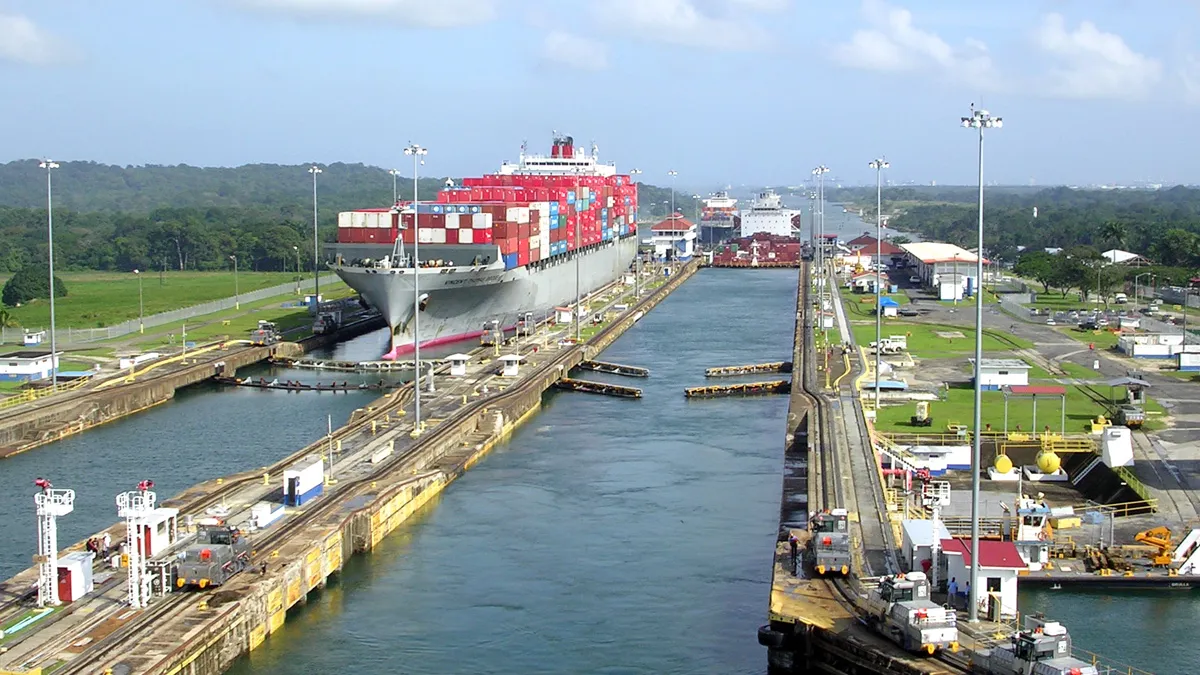UPDATE: Feb. 19, 2020: The Panama Canal water surcharges took effect Saturday at the following levels, a Panama Canal Authority spokesperson told Supply Chain Dive:
- $2,500 per transit for vessels with a length overall (LOA) more than 125 feet and up to 200 feet.
- $5,000 per transit for vessels with LOA more than 200 feet and up to 300 feet.
- $10,000 per transit for vessels with LOA over 300 feet.
As the new fees take effect, the carrier community has voiced opposition.
"The industry is currently facing increased price pressures globally, as demand has been hit hard by coronavirus and markets are adjusting to the new regulations on sulphur levels," Guy Platten, secretary general of the International Chamber of Shipping said in a statement.
Dive Brief:
- The Panama Canal will charge two new fees and change its reservation system to adapt to historic drought that leaves the canal short on the water resources it requires, the Panama Canal Authority announced this week. Adjustments will begin Feb. 15.
- The fees include a new Freshwater Surcharge that affects vessels greater than 125 feet length overall (LOA) and a Vessel Visit Creation Fee that will have two levels depending on the ship's size. The new booking system will require ships to pay booking fees in full "no later than 48 hours depending on the booking period," the authority said.
- "Without fee and operational changes, the Canal's water levels are projected to drop to levels that would affect the Neopanamax and Panamax Locks," the release said.
Dive Insight:
The lakes that feed the canal locks are struggling after "several years" of below-average rain and a 10% increase in evaporation resulting from warmer weather. Last year, rainfall around the Panama Canal was 20% below average and added up to the fifth driest year in the last 70 years, the authority said in a recent report.
The canal implemented draft restrictions on carriers to reduce the amount of cargo carried. A spokesperson for Maersk told Supply Chain Dive last year that the restrictions resulted in the carrier being "unable to serve all the prospective end-customers, who otherwise would be utilising the canal as a route to the [U.S. East Coast] as well as Europe."
The authority plans to increase its investment in projects that address the sustainability of the water supply.
| Fee | Rate |
|---|---|
| Freshwater Surcharge | A fixed fee of $10,000 and a variable fee ranging from 1% to 10% of the vessel's toll will be applied based on Gatun Lake levels (higher water levels mean a lower fee). Applies to all boats longer than 125 feet LOA. |
| Vessel Visit Creation Fee | $5,000 for vessels 91 feet in beam and over, $1,500 for vessels over 125 LOA, but less than 91 feet in beam. Will be deducted from the tool invoice once the ship is in transit. |
SOURCE: Panama Canal Authority
The Panama Canal is also changing the number of daily reservation slots available. There will be six slots for regular ships, 13 slots for supers and eight slots for Neopanamax ships.
"Together, the new measures will allow the Panama Canal to better anticipate the number and type of ships transiting the waterway, and therefore allocate water resources accordingly," the release said.
The canal outlined four steps it is currently using to combat water shortages.
- No longer using the Gatun Hydroelectric Plant to generate power.
- No longer using hydraulic assistance at the Panamax Locks.
- Allowing for tandem lockages, two ships transiting the canal at the same time. This is only possible if the ships are small enough.
- Using of water-saving basins at the Neopanamax Locks.
"As for long-term solutions, the Canal is considering various options, which include, but are not limited to water desalination systems and the optimization of water distribution networks to minimize water loss," a spokesperson for the Panama Canal Authority told Supply Chain Dive. "The Canal also expects to finish a series of studies around midyear on proposals to build new reservoirs or channel water from other sources to the lakes."
Starting Feb. 15, the authority will make real-time data on Gatun Lake levels available on the canal's website, since the new fees are partially determined by this information, a spokesperson for the canal told Supply Chain Dive.
The drought has taken a financial toll. A canal spokesperson told Supply Chain Dive last year it expects to lose $15 million, which is about .5% of the canal's total annual revenue, as a result of this year's drought.
If the canal continues to deal with the drought with cargo reduction measures then it could risk losing market share to either the Suez Canal or West Coast ports, experts said.















